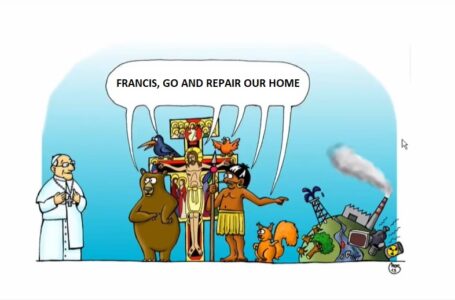Who is Jesus?

This article describes the person of Jesus from a spiritual and biblical point of view.
Different versions of Jesus
Through the centuries we have seen several representations of Jesus which were modelled more on those who came up with them than on the authentic Jesus. This usually happens when an aspect of the Gospel is taken out of context and is magnified beyond all proportion while other aspects are ignored.
Thus, the more legalistic and conservative have created a Jesus who is primarily a teacher of morality and a judge, the more liberal endorse an image of Jesus who is mostly meek and forgiving. The hippie movement created a Jesus who attacked the establishment and was an insurrectionist but who wanted to change the world through the spreading of love. Left wingers state that Jesus was the first socialist and recently, with the rise of the New Age Movement, we have seen him depicted as yet another enlightened teacher among many. Elements of truth are present in all these representations but by taking one aspect to an extreme at the detriment of all other aspects, we risk creating a caricature which distorts rather than sheds light on the identity of Jesus.
Jesus in the Gospel
Every Christian is called to discover who is Jesus and the truths that he imparts. This quest is a lifelong endeavour and the ultimate answer will only be achieved in the beatific vision in the hereafter. A good place to start this journey is in the Gospels. Some aspects of Jesus and his teachings may come as a surprise to us because they contradict the other versions of Jesus described in the introduction which have become more familiar to our society than the Jesus of the Gospels.
Jesus, the presence of God with us
Early on in Matthew’s Gospel (Mt 3-4), Jesus is manifesting his mission. Although he is sinless, he is baptised in the Jordan with the sinners and although he needs no purification, he goes out into the desert. The desert in the Bible is a place where one is purified. Although Jesus is the Son of God, he is tested by Satan. Already it is evident that the mission of Jesus is to restore the horizontality between God and Man that was lost in the Garden of Eden. Jesus, the Immanuel, walks among us as God walked with Adam in the Garden. Jesus is the presence of God woven into the very fibres of our human existence. He is with us in the existential reality of our innermost fears, our sins, our illness, our failures and ultimately in death.
Jesus, the giver of the law of love
Right after these events (Mt 5-7), Jesus is portrayed as the new law-giver. Like Moses, he is standing on a mountain, teaching the crowd about the way of righteousness. He is not the abolisher of the Old Law but the one who is bringing it to its fulfilment. Jesus turns the orientation from the outward keeping of the Law to an inner alignment with the spirit of the Law (Mt 15, 7-8). The Law is founded on the love of God and love of the other (Mk 12, 29; Jn 15, 12-15, Mt 25, 31-46). It is what brings about the Kingdom of God which starts quietly from within but spreads and transforms the world (Mt 13).
Jesus, the saviour of the oppressed
In the Gospel of Luke, Jesus is portrayed first and foremost as the Saviour. As soon as we hear the word Saviour we immediately think that He saved us from sin. However in Luke Jesus is introduced at the beginning of His ministry (Lk 4, 16) as the One prophesied by Isaiah who was going ‘to proclaim freedom for the prisoners and recovery of sight for the blind, to set the oppressed free’. Jesus’ mission is not simply a legal transaction that cancels our sins through the shedding of His blood, as has often been portrayed. It is a holistic salvific plan through which He enters into our existential reality and transforms it. This transformation occurs in our tangible, everyday reality and does not merely happen on a spiritual level. We do not just become holy but we become happy and fulfilled on all levels of our existence.
Jesus, doctor of sinners
But we can reject Him just as He was rejected in Nazareth (Lk 4, 28-29). This rejection is a new way of looking at sin. Until then, Jewish society used to regard sin as breaking the Law of Moses. Public sinners like prostitutes and tax collectors were regarded as impure and the pious were duty bound to ostracise them. Jesus considers sinners as sick people in need of a physician. Thus, He spends much time in their company in order to bring them Salvation (Lk 5, 30-32). He distinguishes another group of people whom He does not justify so easily. These are those who reject Him. These are already condemned (Jn 3, 18). The sins of sinners are a result of their wounds which keep them enslaved but the evil has embraced darkness because it gratifies them and hides their evil deeds (Jn 3, 20).
Going back to our introduction, we can ask ourselves, is Jesus more of a judge or is He infinitely merciful and forgiving? Is He maybe somewhere in the middle of this spectrum?
This question itself with which many still struggle says more about us than about Jesus. Our fallen nature creates a divide between justice and mercy. Many in the Church are also split along these two factions. We attribute this bipolarity which is exclusively ours to God and by extension to Jesus. In order to come to terms with this dilemma, we conclude that God (and Jesus) is both a judge and all merciful. He is somewhere in the middle of the spectrum. He first forgave the adulteress but then He ordered her to sin no more (Jn 8, 11). I could almost imagine Jesus wagging his finger at her like any self -respecting school master.
Jesus, healer of the heart
Since Jesus considered sinners to be sick and in need of a doctor, he would never simply admonish the woman caught in adultery to ‘sin no more’. He would take authority over her spiritual illness and order her to be well like he did innumerable times with physical illness and even death. ‘Sin no more’ is therefore equivalent to ‘Get up! Pick up your mat and walk’ (Jn 5, 1-18) and ‘Lazarus, come forth!’ (Jn 11, 43). He is not admonishing her, He is healing her. If the adulteress being a sinner was indeed ‘sick’, it would have been ridiculous to expect her to stop sinning through her sole efforts. It would have been as ridiculous as expecting the crippled man to walk and Lazarus to rise through their own powers.
This dilemma that we find ourselves in is stemming from legalism. It focuses on sin. Is God going to judge my sin or is He going to close an eye and forgive it? This perspective is fuelled by fear. The more conservative are afraid that others will exploit God’s mercy and fall recklessly into a sinful life. The liberal ones are uncomfortable with the idea of a judging God because they know that ultimately they fall short. So in order to exorcise that fear, they depict God as lenient and compliant.
In reality this complex has nothing to do with God. God (and Jesus) transcends this tug of war. These two schools of thought struggle to understand what Jesus will do with our sin; will He condemn it (and us) or will He forgive it (and us)? In the process of asking ourselves these anxious questions the Good News is being obscured if not altogether lost.
Jesus, giver of life in abundance
What Jesus did with our sin is that He took it on Himself. He penetrated into our very own individual, existential Hell and from there He rose and we rose with Him. Those who accept Him and are willing to leave their comfort zone (Mt 16, 24) go through that same passage from death to life and are given life in abundance (Jn 10, 10).
In our endeavour to understand who Jesus is let us contemplate some phrases that Jesus Himself used to describe Himself:
“I am the bread of life. Whoever comes to me will never go hungry, and whoever believes in me will never be thirsty.” (John 6:35)
“I am the light of the world. Whoever follows me will never walk in darkness, but will have the light of life.” (John 8:12)
“Very truly I tell you, I am the gate for the sheep.” (John 10:7)
“I am the resurrection and the life. The one who believes in me will live, even though they die.” (John 11:25)
“You call me ‘Teacher’ and ‘Lord,’ and rightly so, for that is what I am.” (John 13:12-13)
“I am the way and the truth and the life. No one comes to the Father except through me.” (John 14:6)
“I am the true vine, and my Father is the gardener.” (John 15:1)
Read more:
– The Difference Jesus Makes in My Life
– Top Popes’ Quotes About Following Jesus Christ














